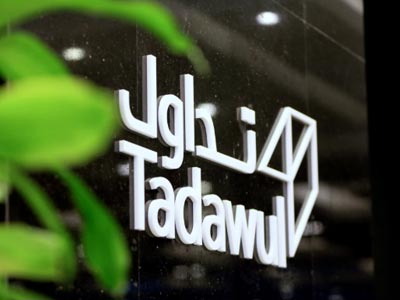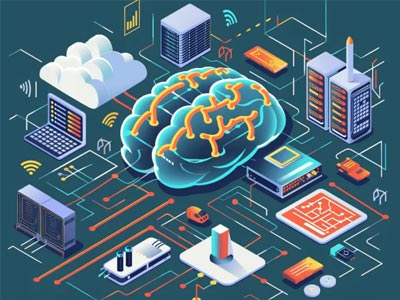When ChatGPT suddenly burst onto the public scene at the end of 2022, many people shrugged. But unnoticed, AI has seeped into our work, studies, and lives like water seeping into sand.
This raises a question: Will AI really take our jobs and those of the next generation? And how will it replace us?
In early September, two Harvard University PhDs in economics published a blockbuster paper that provided a stark answer.
They point out that AI is indeed already taking jobs, but it's doing so covertly, with few even realizing the underlying dynamics.
Even more shockingly, the people most threatened by AI may be the ordinary children of the future.
Middle-class parents have gone to great lengths to send their children to decent universities, hoping they'll secure good jobs and a stable life after graduation. However, this paper finds that ordinary children are being harmed most by AI.
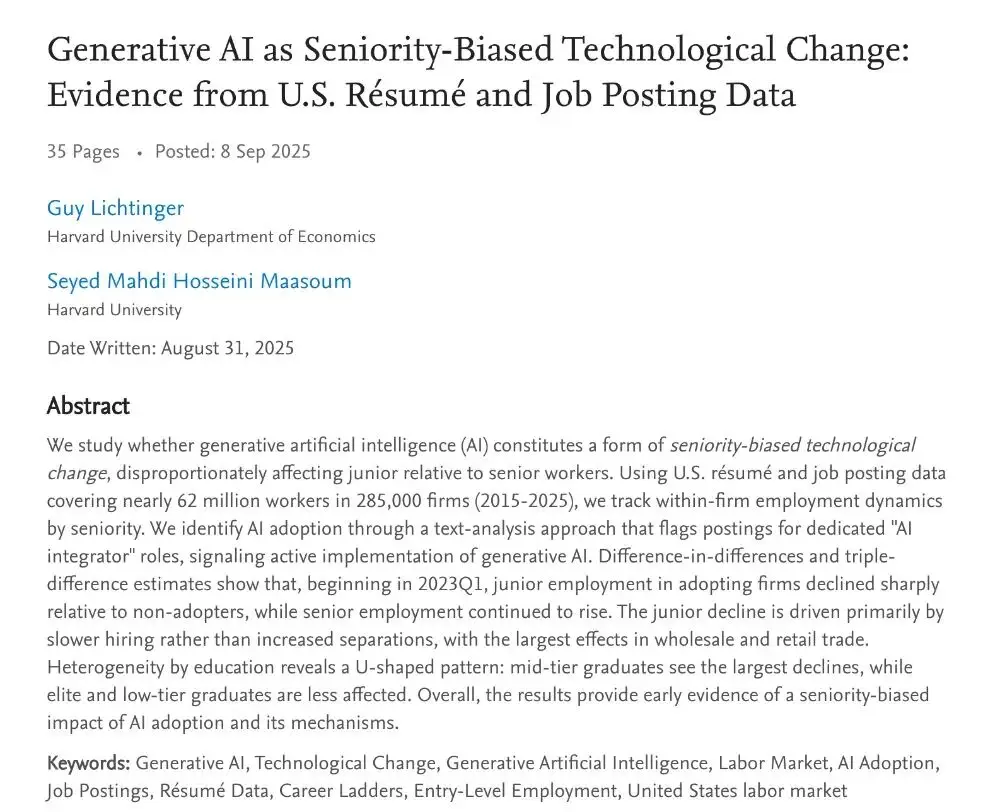
Whose jobs were shattered by AI's first blow?
This landmark Harvard University paper was authored by two economics PhDs, Seyed M. Hosseini and Guy Lichtinger, and behind them were economics heavyweights like Larry Katz.
Larry Katz is not only a Harvard economics professor, but also a senior researcher at the National Bureau of Economic Research, a university that has produced 16 Nobel laureates in economics. He is widely regarded as a leading figure in labor economics, focusing particularly on practical topics that concern us parents, such as the returns to education and wage inequality.
Even more importantly, the scale of the data these two researchers collected was enormous. They analyzed 285,000 US companies, approximately 62 million employee resumes, and over 150 million job postings from the decade between 2015 and 2025.
How impressive is that?
The current employed population in the United States is approximately 160 million. Excluding self-employed individuals and freelancers, this data captures the vast majority of American workers, effectively turning the labor market upside down.
What's even more interesting is the ingenious method these two Harvard PhDs used to verify their findings.
To confirm that AI was indeed impacting employment, rather than simply the economic recession or corporate restructuring, they didn't directly ask companies, "Do you use AI?" Instead, they used a more objective metric: whether they were hiring specialized personnel like "AI Integrators" to prevent companies from lying.
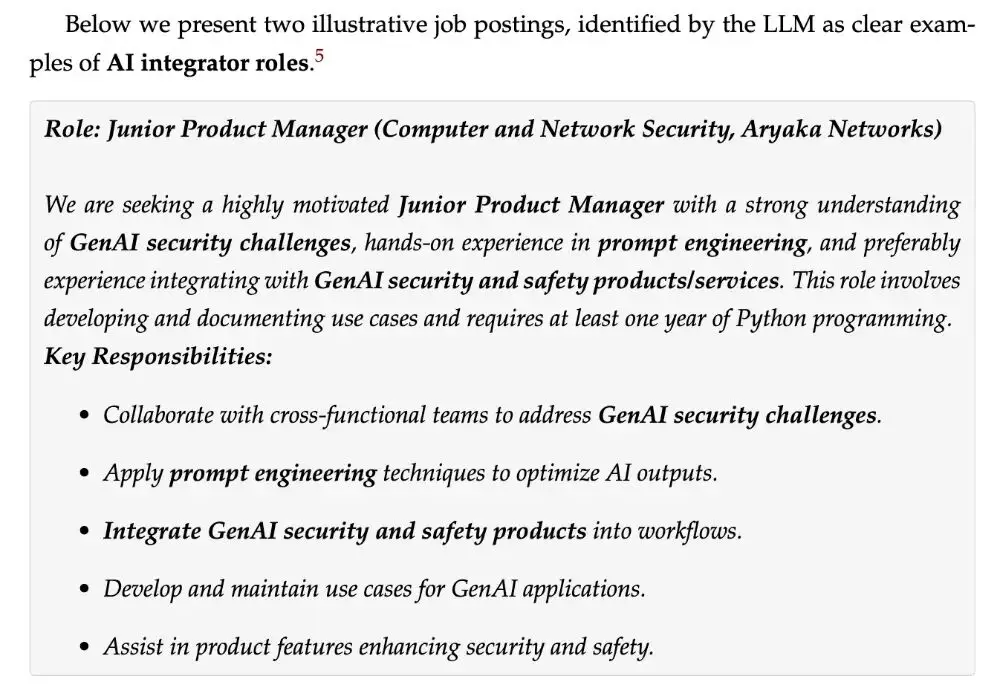
After meticulous data analysis and cleaning, the two researchers found that:
From 2015 to 2022, the employment growth curves for junior and senior employees at companies were very similar, essentially rising in tandem. The exception was a slight dip in junior employees during the pandemic, which quickly recovered.
But by mid-2022, the situation had completely changed. The gap between junior and senior employees gradually widened, forming a scissor-hand trend.
In mid-2022, the employment growth rate for juniors flattened, then suddenly hit the brakes in 2023, then reversed course. In contrast, the employment rate for seniors continued its meteoric rise.
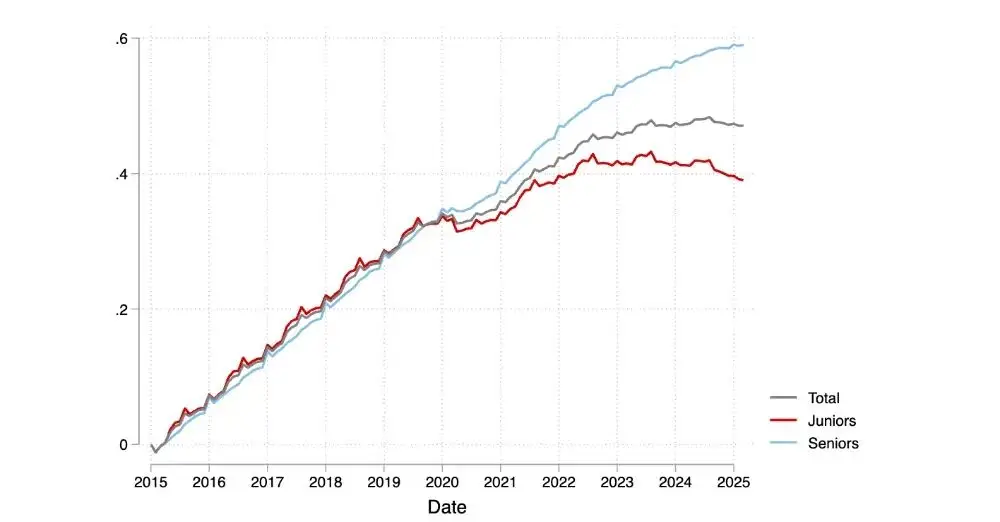
What exactly caused this divergence between the two groups?
One clue points to AI. After all, ChatGPT emerged at the end of 2022. Is this really just a coincidence?
So, two Harvard economics PhDs, determined to give it a try, applied a method called DiD (Dividing the Data) to this idea. They divided companies into two groups: those that hired AI-integrated personnel and those that didn't, conducting a comparative test.
The results were quite shocking.
Since the AI boom, the employment rate of juniors who actively embraced AI has plummeted compared to the control group. By the sixth quarter after AI became widespread, the gap had widened to 7.7%.
The situation for seniors, however, was much better. Regardless of whether AI was used or not, there was no such difference between the two groups. In fact, the growth rate of seniors who used AI was particularly rapid.
The conclusion is obvious: AI isn't stealing the jobs of senior employees, but rather quietly eroding the opportunities of junior employees.
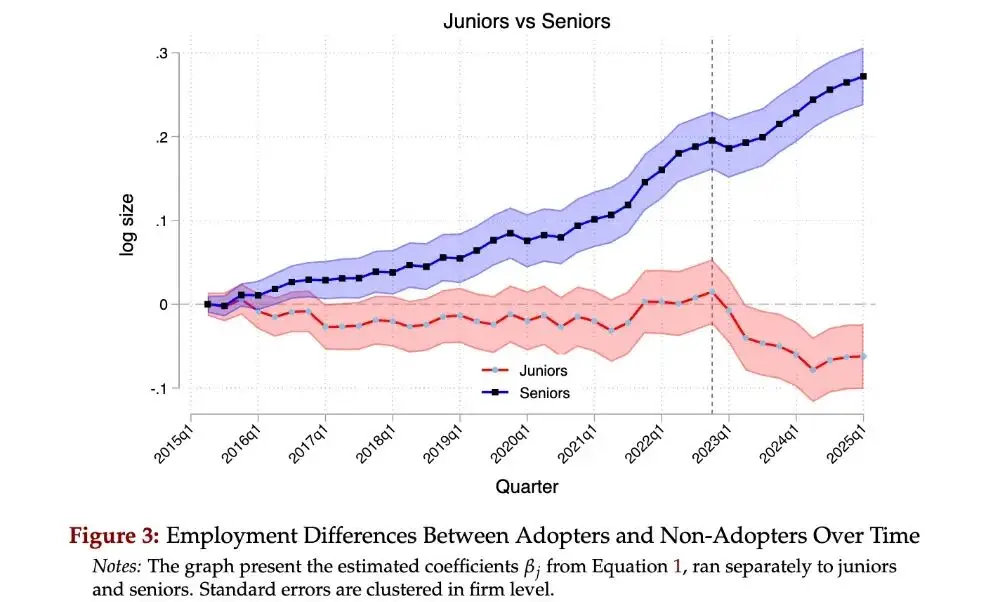
The findings of the two Harvard doctoral students do indeed coincide with reality.
In an interview, Botelho, an associate professor of organizational behavior at the Yale School of Management, stated that AI has taken over a large number of tasks previously performed by junior employees.
Many recent graduates perform knowledge-intensive, entry-level tasks, such as data collection and charting, tasks that AI is fully capable of performing, often with high accuracy.
Because of AI, companies are simply not hiring.
Many people may be curious about how AI is stealing jobs so quietly.
The two Harvard doctoral students' subsequent conclusion is chilling: AI is replacing human labor not through a dramatic wave of layoffs, but through a more subtle method: a hiring freeze.
Researchers categorized company personnel changes into three categories: hiring, resignations, and internal promotions. After careful analysis and calculations, they found the following:
Entry-level positions are shrinking dramatically in companies that widely adopt AI. This isn't due to an increase in departures, but rather to a lack of recruitment opportunities.
After the first quarter of 2023, AI-adopting companies hired an average of 3.7 fewer junior employees. Prior to that, the average number of such hires was approximately 17.45, representing a nearly 22% drop in junior-level hiring.
At the same time, companies hired 0.8 more senior employees.
Even more starkly, this phenomenon has spread across nearly all industries, with a hiring freeze for entry-level positions becoming a common strategy.
The wholesale and retail sectors were hardest hit, with hiring plummeting by approximately 40%.
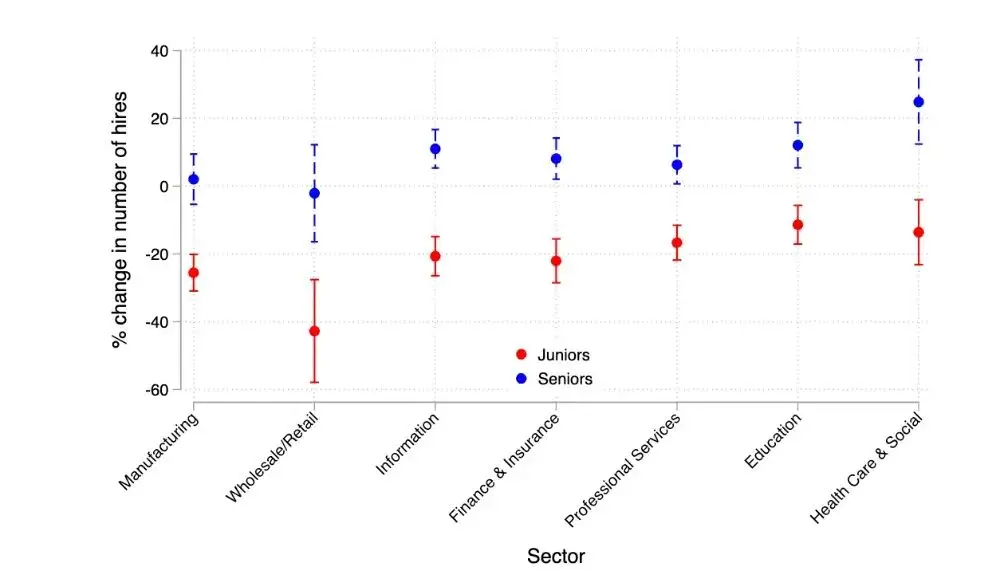
However, the researchers also noted that the turnover rate for junior employees has actually decreased, although the impact is far less significant than the impact of the hiring cuts.
This suggests that the company isn't conducting a large-scale layoff of existing junior employees, but rather opting for a quiet replacement strategy—neither hiring new employees nor firing existing ones.
This isn't hard to understand; layoffs are a time-consuming, costly, and unprofitable undertaking.
Companies that proactively lay off employees face significant compensation costs, potential lawsuits, and even media outcry for letting employees go without cause, not to mention the immense emotional drain of communication during this time.
In contrast, halting hiring is virtually cost-free and risk-free.
Without the influx of new talent, AI-powered existing junior employees may actually offer more opportunities for internal mobility and advancement.
So, if you're still on the outside, getting in will be incredibly difficult, as the first rung of the career ladder has been eliminated.

Data from Revelio Labs, a US labor research firm, shows that overall US entry-level job postings have declined by approximately 35% since January 2023. Handshake, a US job search platform for university graduates, has reached a similar conclusion: companies are suspending the hiring of junior employees.
"If AI can do it, don't hire new people" isn't just a refrain from American companies.
Canadian recruitment consultants, business advisors, and university representatives all say that AI tools like ChatGPT are gradually encroaching on positions previously held by interns and entry-level employees.
For example, a survey of 204 mid-sized Canadian companies by consulting firm RSM found that 91% were using AI, compared to 74% a year ago.
This has put enormous pressure on early-career employees. In the age of AI-driven efficiency, many companies have simply eliminated internships.
AI hasn't sparked a bloody layoff war, but it has quietly formed a conspiracy with companies, gradually rewriting the rules of the job market.
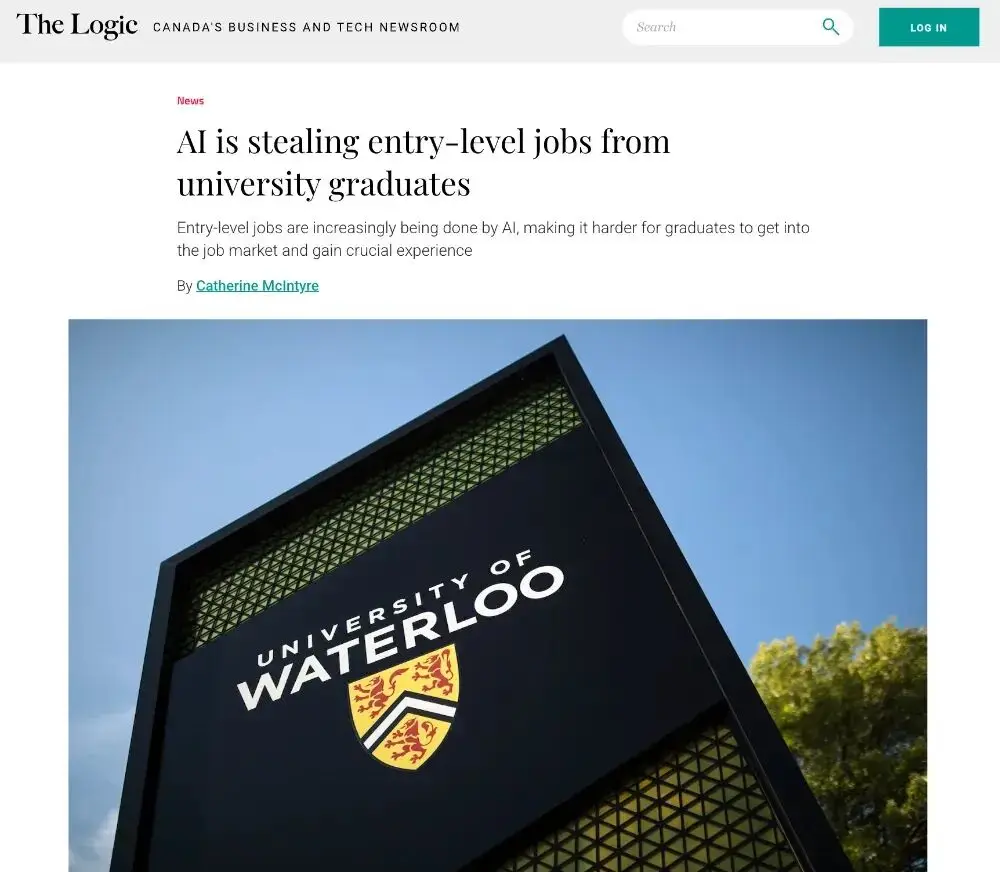
What is the future path for ordinary middle-class children?
If the fact that AI is quietly replacing entry-level workers and crushing young people's employment hopes is already heartbreaking, then the study's final finding is undoubtedly a bolt from the blue for many parents.
Because two PhDs in economics have finally discovered that, with the onslaught of AI, even the academic qualifications of ordinary middle-class students will become obsolete.
The two economists categorized graduate institutions in recruitment data into five tiers (Tier 1 to Tier 5) based on prestige. The results revealed a "U-shaped curve" that completely overturns our conventional wisdom:
- Graduates from Tier 1 (the most prestigious universities) are least affected and are at the top of the job search pipeline.
- Graduates from Tier 5 (the most average universities) experience a minimal impact, statistically negligible.
The real hardship lies with Tier 2 and Tier 3 graduates—those from upper-middle-tier universities with seemingly promising careers. However, they are the first to be impacted by the AI wave and face the most challenging employment situations.
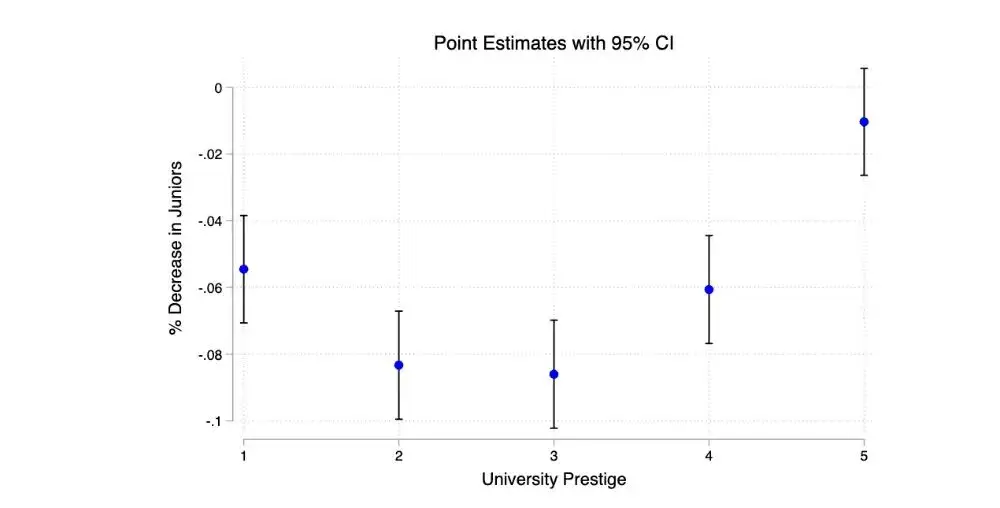
Why does this middle-tier collapse occur? The two authors offer a poignant explanation.
From a corporate perspective, students from top universities receive the highest salaries, but these high costs come with high returns. Companies are willing to pay for their high cognitive abilities, creativity, and exceptional problem-solving skills, and the value they create in the future will far exceed the costs incurred.
For graduates at the bottom of the ladder, companies place greater emphasis on execution. While salaries for these graduates are generally lower, they are also hardworking, stable, and reliable, offering excellent value for money.
However, Tier 2 and Tier 3 graduates, caught between the lines, face a more difficult situation. Their work overlaps significantly with AI, and their skills are neither exceptional nor highly differentiated. They tend to settle into comfort zones, and realistically, their salary expectations are high, so companies simply don't want them.
In other words, top talent is irreplaceable, and the bottom tier remains unreplaceable for now. The average person in the middle becomes the biggest casualty of this price-performance game.
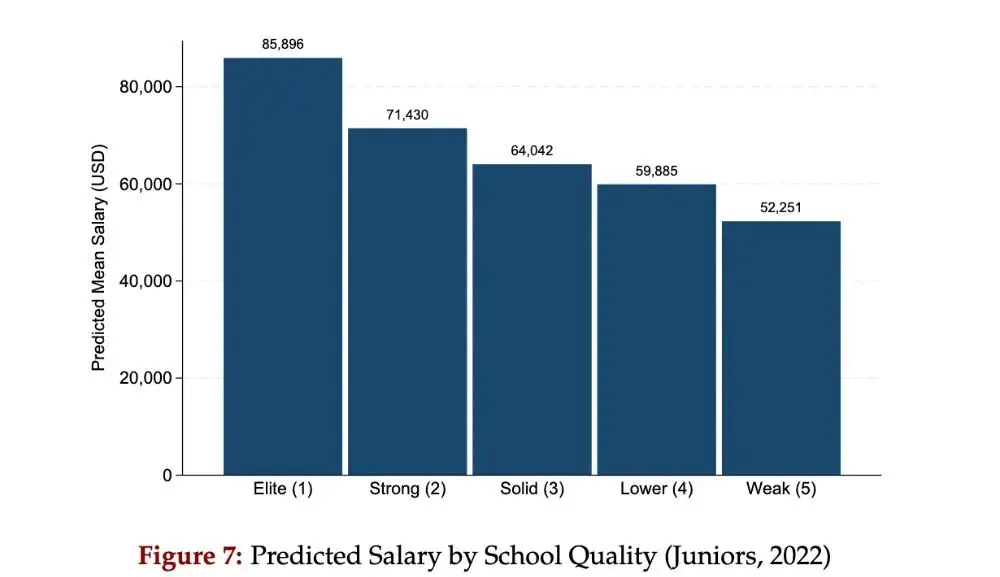
Pessimists are always right, and optimists succeed.
After reading the latest paper by two Harvard economics PhDs, I can't help but admire their unique and insightful analysis, and I'm also chilled by the harsh realities they reveal.
But this paper doesn't just throw out pessimistic conclusions; it forces us to see the reality clearly: how should we prepare for this future that has already arrived?
In fact, to some extent, this paper also provides guidance for us and our children.
First, build complex skills and stop doing the most basic tasks.
Don't get caught up in being a cog in the wheel, burying yourself in repetitive work or learning tasks that are easily automated.
Instead, proactively outsource these tasks to AI tools and become AI's boss. Free yourself up as soon as possible to tackle more complex, creative tasks that require more human judgment, making yourself more valuable.
The World Economic Forum's "Future of Jobs 2023 Report" identifies creative thinking, analytical thinking, empathy, curiosity, and resilience as the skills most sought by global employers.
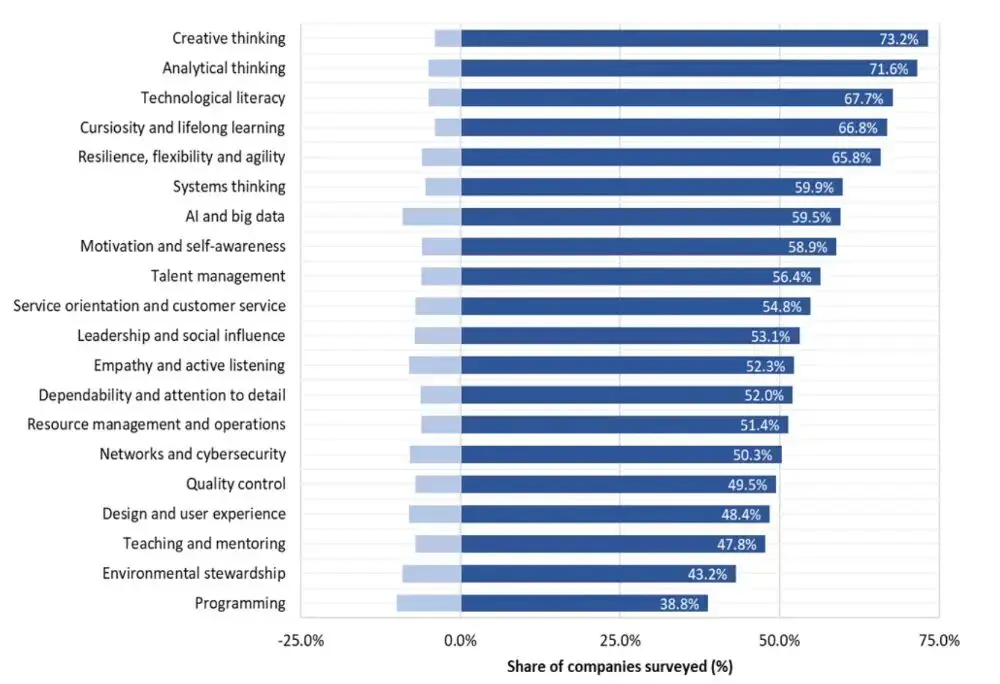
Secondly, actively embrace AI and pursue lifelong learning.
Future competition will essentially be a competition of learning speed and adaptability.
Technology is changing rapidly. No industry remains static, and no skill retains its value forever. The era of learning once and using it for life is over.
According to the World Economic Forum, by 2030, one billion people will need reskilling.
Forty years ago, the half-life of a skill was over ten years, meaning people didn't need to frequently update their skills and knowledge. However, this cycle has now shortened to around four years, and in areas like AI, it may even accelerate to two years.
In other words, the skills we possess are depreciating at an unprecedented rate.
Therefore, everyone needs to continuously learn, evolve, adapt quickly, and reinvent themselves to discover new opportunities. Parents, in particular, should become lifelong learners and set an example for their children.
But more importantly, don't learn blindly.
In a world of rapidly evolving skills and limited time, what you learn is more important than why you learn. Only by recognizing your strengths and weaknesses, knowing what works for you, and what you should focus on, can you truly learn effectively.
Finally, abandon the illusion of academic credentials and focus on yourself.
Education is still important, but it's only a starting point, not the end. Companies never value a mere diploma; they value the true ability and immense potential of a talent.
As parents, if we clearly know our children aren't cut out for top universities like Harvard, Yale, and Pfizer, there's no need to push them too hard, let alone fall into endless involution and anxiety.
Relax a little and proactively let go of expectations for a prestigious degree. This will open up new avenues for advancement.
Even attending a modest school doesn't mean your life is set in stone. The paper's final conclusion is a shot in the arm.
For most families with ordinary children, rather than spending money on practice tests and straining their children's bodies and minds to get into a prestigious university, it's wiser to ensure their emotional stability and physical and mental health, support them in identifying their passions and strengths early and continuously engaging in them, and cultivate the habit of independent learning, the confidence to not be afraid of failure, and maintain an open mind.
As long as children have a solid foundation and a desire to strive for progress, they will be the most resilient in the AI era and even able to turn desperate situations around.
After reading this article, you may feel panicked, and that's normal. But remember this: Pessimists are always right, but optimists often succeed.
Reference link: https://thelogic.co/news/ai-graduate-jobs-university-of-waterloo/



